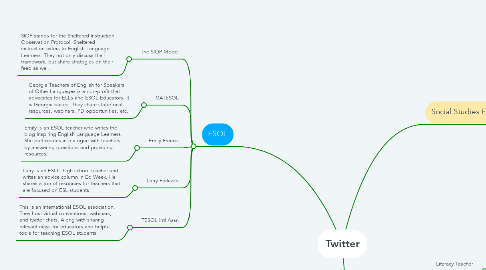
1. ESOL
1.1. The SIOP Model
1.1.1. SIOP stands for the Sheltered Instruction Observation Protocol. Sheltered instruction caters to English Language Learners. They not only discuss their framework, but share strategies on their feed as well.
1.2. GATESOL
1.2.1. Georgia Teachers of English for Speakers of Other Languages is a non-profit that advocates for ELLs and ESOL Educators. It is Georgia based. They share state/local resources, webinars, PD opportunities, etc.
1.3. Emily Francis
1.3.1. Emily is an ESOL teacher who writes the blog Inspiring English Language Learners. She participates in dialogue with teachers by answering questions and providing resources.
1.4. Larry Ferlazzo
1.4.1. Larry is an ESOL high school teacher and writes an advice column in Ed Week. He shares a ton of resources for teachers that are focused on ESL students.
1.5. TESOL Intl Assn
1.5.1. This is an international ESOL association. They host virtual conventions, webinars, and twitter chats. Along with sharing relevant news for educators and helpful tools for teaching ESOL students.
2. Social Studies Education
2.1. NCSS
2.1.1. This the National Council for Social Studies. They share news for educators related to social studies, general instructional practices, resources, websites, and education policy resources.
2.2. ASCD
2.2.1. The Association for Supervision and Curriculum Development is a nonprofit that provides support for educators. They share articles from various educators and experts on a WIDE range of topics.
2.3. GaDOE_SS
2.3.1. This is the official account for the Ga department of education the social studies division. They share instructional strategies and important policies as well as Georgia Standards for Excellence resources.
2.4. GA Council for SS
2.4.1. This is the Georgia Council for Social Studies. I am a member of this association. They host a great convention every year and share local news about SS and a good amount of history resources.
2.5. Common Sense Education
2.5.1. This feed shared digital learning tools for educators and are a sub account of Common Sense. They share blog posts from their website that are usually a compilation of resources for various topics - civil rights, literacy, web apps, as well as resources for parents.
3. Literacy
3.1. Literacy Teacher
3.1.1. This twitter account is aimed towards teachers in classrooms. They have a Youtube channel where she talks about various issues in education and explains literacy strategies.
3.2. The News Literacy Project
3.2.1. Their focus is on helping teachers, help students develop news literacy, or being able to fact check new sources and other primary sources. This is important in SS for literacy because we use a lot of primary sources.
3.3. Choice Literacy
3.3.1. This handle shares mostly articles written by educators and experts and posted on their website. They have two different blogs - one of educators and one for edu leaders, like instructional coaches.
3.4. ILA
3.4.1. The International Literacy Association shares book lists for educators, TED Talks, and how literacy is changing during quarantine/COVID. They also share grant opportunities and other resources for teachers world wide that ultimately promotes literacy.
3.5. National Center on Improving Literacy
3.5.1. NCIL provides evidence-based resources for educators. Their main focus is helping improve literacy skills of students who have literacy-related disabilities like dyslexia. They share a mix of resources for parents and educators. Much of the items they share are research based. They share additional programs and resources for improving literacy.

